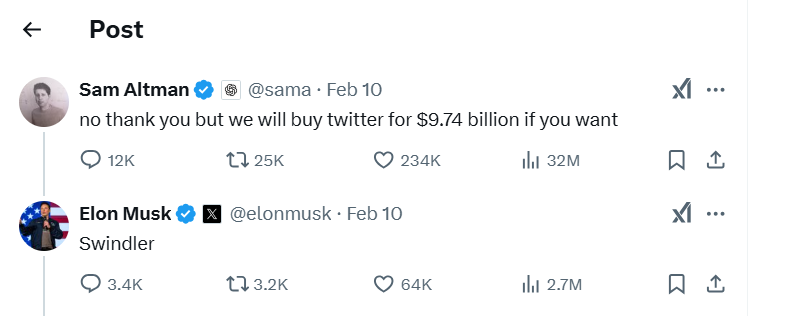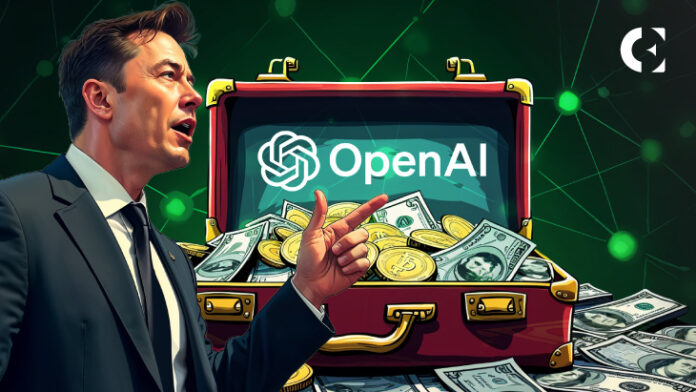- Elon Musk proposed withdrawing his $97.4 billion bid if OpenAI halted its transition to a for-profit model.
- OpenAI CEO Sam Altman rejected the offer, calling the company’s non-profit structure “not for sale.”
- The dispute underscores Musk’s broader concerns about OpenAI’s shift toward commercialization.
Tech billionaire Elon Musk proposed a $97.4 billion bid to acquire OpenAI’s non-profit arm, but only under the condition that the AI firm agreed to maintain its non-profit model. This move was swiftly countered with unexpected wit and strategy by OpenAI CEO Sam Altman.
According to a court filing on Wednesday, Musk stated that if OpenAI’s board preserved the company’s original charitable mission and removed the “for sale” sign, he would withdraw his offer.
Musk proposed that if instead, OpenAI persisted in its for-profit transition, the non-profit should receive market value compensation.
A $9.74 Billion Twitter “Counter”
However, with a pointed jab at Musk, OpenAI CEO Sam Altman dismissed Musk’s bid and fired back with a counter-offer of his own.
The company also reiterated that Musk’s proposal directly opposed his existing lawsuit against OpenAI, aimed at halting the transition to private ownership.
Related: Elon Musk’s Lawsuit Against OpenAI Will Be Foundational: Charles Hoskinson
Altman’s “Decimal-Point Diplomacy”
Altman’s witty and precisely calculated counter-offer, saying, “No thank you, but we will buy Twitter for $9.74 billion if you want.” Musk responded with a single-word reply: “Swindler.”

Notably, Musk sued OpenAI in August, accusing Altman and other executives of deviating from the company’s founding principles. The dispute escalated last week when Musk claimed OpenAI attempted to “delete” its non-profit component.
Related: OpenAI Secures $6.6B in Funds; Can Decentralized AI Keep Up?
OpenAI’s $150B Valuation and the Lingering Musk-Altman Divide
OpenAI has been restructuring into a for-profit benefit corporation since 2023. The new model aims to attract investors by reducing non-profit board control while allowing a minority stake to remain.
Sources estimate OpenAI’s valuation could climb to $150 billion under this structure. A company spokesperson emphasized OpenAI’s commitment to its mission: “We remain focused on building AI that benefits everyone. The non-profit remains core to our mission and will continue to exist.”
In terms of background, Musk co-founded OpenAI in 2015 as a non-profit AI research lab but left in 2018 due to disagreements over its direction. Since his departure, OpenAI has secured billions in funding, including substantial investment from Microsoft, and launched ChatGPT, now boasting over 200 million weekly active users.
Musk has repeatedly criticized OpenAI’s commercialization, arguing it has drifted from its original mission. His latest takeover attempt highlights his ongoing concerns about AI governance and ethics. And now with Altman’s sharp counter-offer a whole new dimension to this ongoing saga has opened up: a battle not just of principle, but of strategic and financial wit.
Disclaimer: The information presented in this article is for informational and educational purposes only. The article does not constitute financial advice or advice of any kind. Coin Edition is not responsible for any losses incurred as a result of the utilization of content, products, or services mentioned. Readers are advised to exercise caution before taking any action related to the company.







